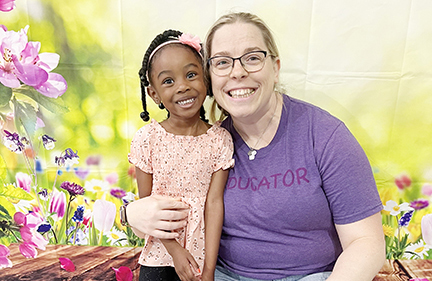By Alyssa Garnett
Amid the economic and population growth that all of us are celebrating in Nashville is an alarming decline in the most important part of Nashville’s educational landscape, a decline that has long-term consequences for our community – early childhood education.
All parents want their children to have the best possible start in life, and the importance of early childhood education is well documented. It provides children with strategies that help them develop the emotional, social, and cognitive skills needed to become lifelong learners. It creates the foundation for language and literacy, for thinking, for self-control, and for self-confidence. According to studies, children who are in childcare centers beginning at six months of age are better prepared to enter PreK and kindergarten, read at or above grade level by 1st grade, and form stronger social bonds with their peers.

Unquestionably, this time is important to their children’s long-term health, education and well-being.
The problem in this city and across the country is that opportunity has not always been available to every family or child. The simple fact is that a parent’s zip code or income often determines what type of start that child will receive. And because of the pandemic, when many young children are desperately in need of the social and academic benefits of child development centers, many of these centers have closed, creating high demand for quality, affordable childcare that far outweighs current availability. This leaves parents with nowhere to turn.
The New York Times story earlier this year drove home this point, showing how “income inequality shapes access to basic necessities, like childcare, and how it has become harder for lower- and middle-income parents, usually women, to get back into the workforce.”
Combine this situation with Nashville’s growth and you have more families chasing fewer and fewer childcare options. The number of new people moving to Nashville each day is now close to 70. They are attracted to what this vibrant city offers and to the businesses, new and established, that are looking for talented employees to drive their economic success. But while jobs may be growing, a place for their children to begin their education is not. More than 200 childcare centers have closed statewide since the onset of the pandemic. I field dozens of calls a week from soon-to-be parents – even new parents – looking for an opening for their infant, and in most every instance, I have to tell them that the waiting list at Saint Mary Villa is at least 12 months long. It is painful to hear the disappointment in their voices when they hear this news, but it is the reality so many families are facing. And they also face the reality that public preschool doesn’t offer aftercare, which works a hardship on families who work.
Saint Mary Villa Child Development Center is one of the success stories. Started as an orphanage 160 years ago and converted to a childcare center in the late 1970s, our driving force is to offer all children, especially our most vulnerable ones, affordable, high-quality early child development from day one. We do that with a curriculum that teaches and engages the whole child. Learning through play, social interactions, stories, songs as well as teacher-guided activities, children can engage in the curriculum throughout the day. The curriculum also creates a safe space for children to learn how to express feelings and emotions as well as a place for them to process their own individual emotions.
The need for reading skills is driven home by Tennessee’s new legislation requiring proof that a child has reached 3rd grade reading level by 3rd grade. That’s why our Read to Succeed program with United Way is so important to our center. Hitting that reading level by 3rd grade is easier if you develop reading skills in a center like ours, and our students’ performances demonstrate that.
We participate in the state childcare assistance program, but for families who do not qualify, we provide childcare on a sliding fee scale based on your family’s annual household income. We also provide breakfast, lunch, and afternoon snack to ensure that everyone has a full belly and is eating well balanced meals. And because we provide quality care that is affordable, we serve families from all over Nashville and the surrounding areas which creates diversity within our classrooms. This combination means that we do have a full center and a long waiting list.
But Nashville needs to address the lack of childcare development centers like ours. We need to focus attention and provide incentives and support for professional educators to serve our children through excellent, curriculum-based centers. Funds need to be allocated to prepare more early childhood educators to meet this growing need, and businesses need to invest in centers for their employees to help solve this problem.
I have been working in early childhood education for more than 15 years and I have seen its impact. I see it every day in the eyes of the diverse group of young boys and girls – and the exceptional educators – whom I am privileged to be with each day. Nashville needs to make early childhood education a bigger part of its own development so that the newcomers to our city – businesses and the people who work for them – are benefiting from all that Nashville has to offer.
Alyssa Garnett is the Executive Director of Saint Mary Villa Child Development Center on Heiman Street, near Fisk University.


